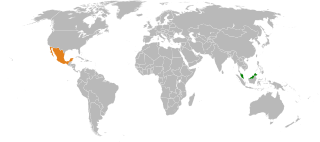
India, officially the Republic of India, has full diplomatic relations with 201 states, including Palestine, the Holy See, and Niue. The Ministry of External Affairs (MEA) is the government agency responsible for the conduct of foreign relations of India. With the world's third largest military expenditure, second largest armed force, fifth largest economy by GDP nominal rates and third largest economy in terms of purchasing power parity, India is a prominent regional power and a rising superpower.

Malaysia is an active member of various international organisations, including the Commonwealth of Nations, the United Nations, the Organisation of Islamic Cooperation, and the Non-Aligned Movement. It has also in recent times been an active proponent of regional co-operation.

Though the Ministry of Foreign Affairs (MOFA) is the government agency responsible for the conduct of foreign relations of Nepal, historically, it is the Office of Prime Minister (PMO) that has exercised the authority to formulate and conduct policies related to Nepal's foreign affairs. As a landlocked country wedged between two larger and far stronger powers, Nepal has tried to maintain good relations with both of its neighbors, People's Republic of China and Republic of India. Nepal's relationship with China, India, and the United States has remained utmost priority for successive Nepali governments. The relationship between Nepal and India however was significantly hampered during the 2015 Nepal blockade by pro-Indian anti-Nepal protestors, where the Government of Nepal accused India of using "Russia-Ukraine" tactics to cause unrest along Nepal's southern border using ethnically Indian residents of Nepal. India strictly denied the allegation and said the unrest were solely due to Madheshi protesters. For the most part though, Nepal has traditionally maintained a non-aligned policy and enjoys friendly relations with its neighboring countries and almost all the major countries of the world.

Greece–Malaysia relations are foreign relations between Greece and Malaysia. The Greek embassy in Jakarta, Indonesia is also accredited to Malaysia, while the Malaysian embassy in Bucharest, Romania, is also accredited to Greece. There is an Honorary Greek Consulate in Kuala Lumpur. Correspondingly, the Malaysian embassy in Bucharest, Romania is at the same time accredited to Greece and there is a Malaysian Honorary Consulate in Athens. The Honorary Consul is Dr. Savvas Tzanis. The former Yang di-Pertuan Agong and current Raja of Perlis, Tuanku Syed Sirajuddin visited Greece in August 2004 to attend the 2004 Athens Olympics.

Indonesia and Mexico established diplomatic relations in 1953. Both nations view their counterpart as strategic partners in each other's regions; Indonesia in Southeast Asia and Mexico in Latin America. Both nations are mutual members of the Asia-Pacific Economic Cooperation, Forum of East Asia-Latin America Cooperation, Group of 15, G-20 major economies, MIKTA, United Nations, and the World Trade Organization.

Malaysia–Nepal relations refers to bilateral foreign relations between Malaysia and Nepal. Malaysia has an embassy in Kathmandu, and Nepal has an embassy in Kuala Lumpur.

Belarus and Malaysia established diplomatic relations in 1992. Neither country has a resident ambassador. Belarus embassy in Jakarta is accredited to Malaysia. Both countries are members of the Non-Aligned Movement.

Malaysia–Mexico relations are the bilateral relations between Malaysia and Mexico. Both nations are mutual members of the Asia-Pacific Economic Cooperation.

Bangladesh–Mexico relations are the bilateral relations between Bangladesh and Mexico. Both nations are members of the United Nations and the World Trade Organization.

Malaysia–Mongolia relations refers to bilateral foreign relations between Malaysia and Mongolia. Neither country has a resident ambassador. Malaysia has an honorary consulate in Ulaanbaatar, and Mongolia honorary consulate in Bangkok was accredited to Malaysia.

Guyana–Spain relations are the bilateral and diplomatic relations between these two countries. The embassy of Guyana in Belgium is accredited for Spain. The Spanish embassy in Port of Spain, Trinidad and Tobago, is accredited for Guyana, and Spain has an honorary consulate in Georgetown.

Marshall Islands–Spain relations are the bilateral and diplomatic relations between these two countries. The Spanish embassy in Manila, Philippines, is accredited for the Marshall Islands, plus Spain has an honorary consulate in Majuro. The Marshall Islands have an embassy in Madrid and a consulate in Barcelona.

Latvia–Mexico relations are the diplomatic relations between Latvia and Mexico. Both nations are members of the Organisation for Economic Co-operation and Development and the United Nations.














